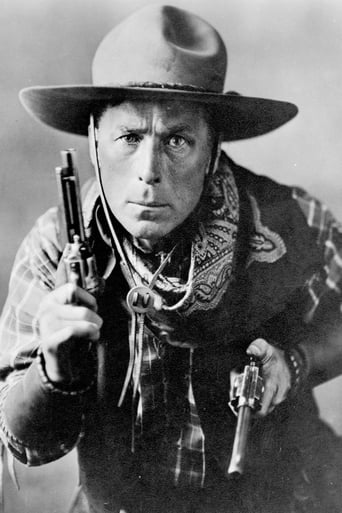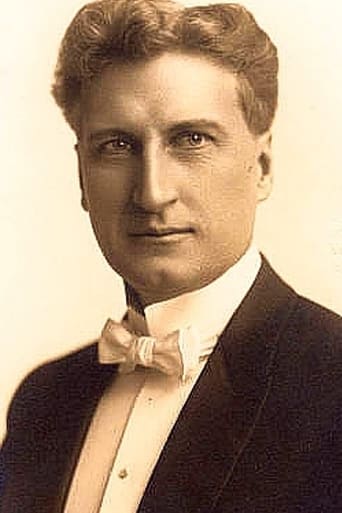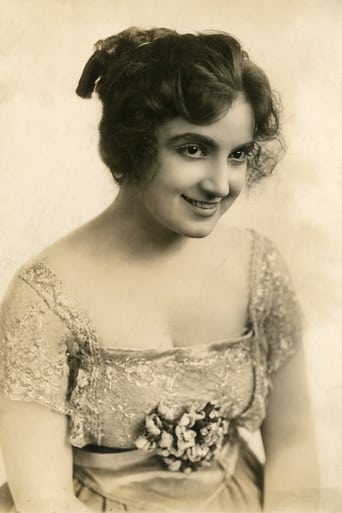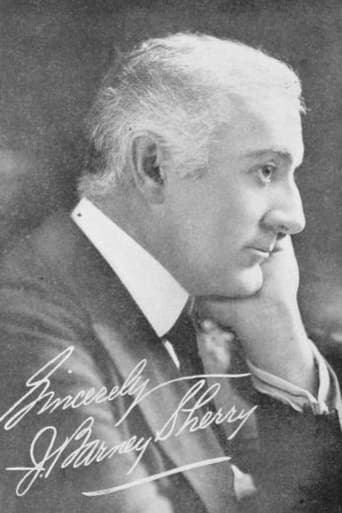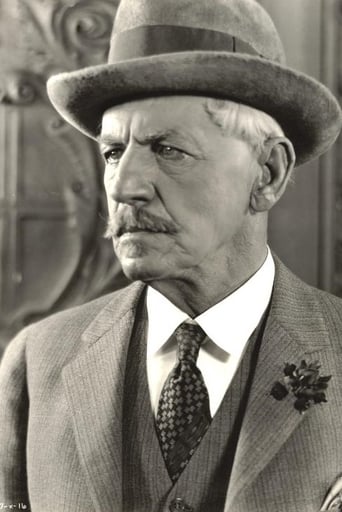ChanFamous
I wanted to like it more than I actually did... But much of the humor totally escaped me and I walked out only mildly impressed.
Erica Derrick
By the time the dramatic fireworks start popping off, each one feels earned.
Zandra
The movie turns out to be a little better than the average. Starting from a romantic formula often seen in the cinema, it ends in the most predictable (and somewhat bland) way.
Roxie
The thing I enjoyed most about the film is the fact that it doesn't shy away from being a super-sized-cliche;
briantaves
William S. Hart had already had success in adapting his own memories into a stage persona that convinced audiences, and he was now determined to bring it to the screen. He believed that his old stage friend Thomas Ince, now a producer, had promised to personally direct him and provide him the best stories. As I outline in my Ince biography, and from the outset their relationship was rocky. In May 1914, Hart began to appear in two-reel shorts directed by leading man Thomas Chatterton, a novice director. His Hour of Manood was the first, taking 12 days to film on a budget of $8,000, and the filmmaking process left Hart uncomfortable. He felt equally discouraged when, the day after finishing His Hour of Manhood, he began his next movie, Jim Cameron's Wife.Both pictures were released in July, and Ince was ready to assign Hart to a similar role of the same kind. Hart threatened to return to the stage instead, and Ince was persuaded to allow him to try a more "authentic" story. Ince recalled a two-reeler, Getting His Man (1911), and suggested it might be expanded. Five days later Hart returned with a treatment that included a synopsis of the first fifty scenes, and it was turned over to C. Gardner Sullivan.Hart's personal note of authenticity in the resulting movie, The Bargain, is apparent from the opening credits, when the major players are all introduced, bowing between curtains as they fade to be seen in their costume. Unlike the other male leads, Burke, Sherry, and James Dowling, only Hart's visage is not obscured behind heavy makeup. The viewer is left to conclude that only Hart is what he seems—he needs no false whiskers or wig to be a man of the West.The movie opens with dime novel prose that would seem to be at odds with its ostensible realism. A\"The West! The Land of Vast Golden Silences Where God Sits Enthroned on the Purple Peaks and Man Stands Face to Face With His Soul." A pan of Grand Canyon vistas follows; the June 11 to August 5 shooting schedule for The Bargain included a location trip. Telegraph intertitles reveal the setting is in the year 1889.The Bargain establishes the pattern of the character types, trajectory, and conflicts which would become the Hart persona. He is the daring outlaw Jim Stokes, a self-sufficient two-gun man first seen rolling a cigarette. His devil-may-care confidence allows him to rob even a well-guarded stagecoach alerted to his presence in the area: he sets up hats and rifles behind boulders and convinces the escort that his confederates are watching them. But once he leaves with the money chest, the guards realize the ruse, pursuing Stokes into the badlands and wounding him.Found by prospector Phil Brent (Sherry), Stokes is nursed back to health, winning the love of the prospector's daughter Nell (Clara Williams). They are unaware of Stokes's criminal past. While not losing his courage and resourcefulness, love has brought about a moral reformation, and Stokes determines to return the money to the stage company. Meanwhile, reward posters cause him to be recognized, and he must flee to the border town of El Tempo, Arizona. He sends his horse back with a note for Nell, which is intercepted by her father, who keeps the truth from her.In El Tempo, the opening pan of the Grand Canyon is echoed with a long circular shot, giving a similar sense of verisimilitude. This time, however, instead of the clean vistas of nature, the audience is drawn into the corrupt din of the saloon. Sheriff Walsh (Burke) corners Stokes in the hotel and ties him up, then telegraphs to claim the reward. Waiting for the stage, the lawman proves just as susceptible to temptation as the outlaw. Drawn to the roulette wheel, and unaware that it is Afixed,@ he soon loses his money—and in a desperate bid to win it back, gambles the stage funds with the same result.When Walsh confesses to Stokes, he can only laugh at the irony. However, he makes a bargain to save both of them. He steals the money, giving it back to the sheriff, who lets Stokes go. He returns to Nell to confess his past. Momentarily hesitant, she decides to follow him to Mexico. Stokes signals to Walsh, waving his hat, signaling that he is safely away.The Bargain, released in five reels in December by Famous Players-Lasky, became Hart's first hit, although he was billed after Williams and Sherry. It would be reissued under the Paramount banner, this time with Hart starred first. Another feature of similar length for Ince, On the Night Stage, was begun by Hart the day after completing The Bargain, in which Hart was fourth-billed after Robert Edeson, Rhea Mitchell, and Herschell Mayall. Despite the billing, Hart was already advertised as "the most talked of Motion Picture Actor to-day (His wonderful work in The Bargain will go down in the history of Motion Pictures) ...."
Michael_Elliott
Bargain, The (1914) ** 1/2 (out of 4)After robbing a stagecoach, bandit Jim Stokes (William S. Hart) is shot but manages to make it to a ranch where a woman (Clara Williams) nurses him back to health. Stokes decides to marry the woman and go straight so he returns the stolen money to the Sheriff (J. Frank Burke) but he ends up losing it gambling so he makes a bargain with the bandit to clear both of them. THE BARGAIN probably has more history than entertainment to it but if you're a fan of silent Westerns or Hart then it's still worth viewing. The movie is best remembered today for being an early Paramount picture from producer Thomas H. Ince. It's also remembered for being Hart's first feature-length film but that there is some of the problem with the film. It's funny to see that even at this early part of his career Hart has no problem playing the bad guy willing to turn good for love. I thought Hart was very believable in the part and he managed to work both the good and bad in the character. I've always enjoyed seeing Hart play the bad guy even if the "performance" doesn't have to be that strong. That terrific face of Hart's perfectly gets across the coldness of his characters and he also manages to tell quite a bit with his eyes. The sympathy comes out of his eyes and this is especially true during the sequences where he's trying to make the woman understand that he does want to go straight. Williams is also very good in her role. The character isn't written all that great but the actress manages to be charming and it's easy to see why Hart would fall for her. There's a few action pieces sprinkled throughout but the majority comes towards the end when Hart must go into action over the double-cross. At 70-minutes I think there's no enough story to fully carry the picture as it really doesn't seem more like a three-reeler that has been stretched to the max just to be sold as a "feature", which is something that was common around this period.
wes-connors
After being wounded in a shoot-out, steely-eyed outlaw William S. Hart (as Jim Stokes) is found by prospector J. Barney Sherry (as Phil Brent). Mr. Hart lies to his rescuer, "I was chased by Indians and one of them got me," and is brought back to Mr. Sherry's Arizona cabin. There, Hart recovers from his wound, and falls in love with Sherry's pretty dark-haired daughter Clara Williams (as Nell Brent), who nurses him back to health. Reformed by love and marriage, Hart decides to return the money stolen before he was injured, but he is arrested by Sheriff J. Frank Burke (as Bud Walsh)..."The Bargain" is struck between Hart and Sheriff Burke, who loses the recovered money gambling - if Hart will help him get the money back, the Sheriff will let Hart go free. Variations of this intriguing moral/amoral storyline would be repeated in subsequent Hart features - a few were better, and more than a few were worse; "The Bargain" got there first. The Thomas H. Ince production benefits from the Arizona location photography (shot in the Grand Canyon) by Joseph August. The unusual opening "credits" were not original, but they seem like a perfect introduction to the picture.****** The Bargain (12/3/14) Thomas H. Ince, Reginald Barker ~ William S. Hart, J. Frank Burke, Clara Williams
F Gwynplaine MacIntyre
'The Bargain', a William S. Hart western, is one of the many thousands of silent films which survive only because of the U.S. government's 'paper prints' law, which seemed rather bizarre at the time, but in hindsight may indicate that the U.S. government know what they're doing after all. I'll describe the situation, and you can judge for yourself.In the late 19th century, when movie production companies first tried to copyright their films in the U.S., the Library of Congress stated that only artistic works published on PAPER could be registered for copyright. Movies, being photographed on celluloid, were ineligible. This seems rather a capricious ruling, but perhaps the LoC simply didn't want to accumulate cans of film stock ... which, in those days, were usually highly flammable nitrate-emulsion celluloid. (Although the LoC acquired plenty of nitrate films eventually.) This decision prompted many production companies to make special 'paper print' versions of their films, to be used solely for registering U.S. copyright and for storage in the Library of Congress. Essentially, a paper print reproduces the movie frame-by-frame on long paper streamers rather than celluloid filmstrips. Such prints cannot be projected, but can be bound into books and 'read'.The LoC's decision was borne out when those nitrate prints started to decompose. Many early movies -- including 'The Bargain' -- have no known surviving original film prints, and exist today only because the paper prints registered in the Library of Congress were eventually re-photographed onto acetate-emulsion (safety) film stock. Thank you, Uncle Sam.Unfortunately, some film producers weren't completely honest when registering their movies for copyright. I saw 'The Bargain' in October 2006 at the Cinema Muto festival in Sacile, Italy, where it was screened from an acetate print struck from the paper original. As much as I enjoyed this film, I was more interested in seeing another one which the festival programmers scheduled along with 'The Bargain', a film so rare that it isn't listed in IMDb yet: 'Marceline, the World-Renowned Clown of the N.Y. Hippodrome'. This purported to be the stage act of a famous European clown who was (among other things) Chaplin's mentor. To my great annoyance, the producers of that movie had only bothered to convert the first few frames of their nitrate filmstrip into a paper print for the copyright office ... so the programmers at Cinema Muto could only show us those opening frames, looped several times.SPOILERS AHEAD. 'The Bargain' was made early in William S. Hart's career, but shows his screen character firmly in place. Rather than playing a standard white-hat hero or black-hat varmint, Hart typically played corrupt characters who are reformed in the last reel, usually by the love of a good woman. Here, Jim Stokes (Hart) is a stagecoach robber who's wounded while stealing the express-company's money, but is saved by miner Phil Brent and his pretty daughter Nell. After Jim marries Nell, his past catches up with him ... in the form of sheriff Bud Walsh, determined to bring Jim to justice. Jim has conveniently saved the stolen money all this time, and now he claims that he intends to make restitution ... which I found unlikely, since he was last seen scarpering for the Mexican border when the sheriff caught up with him. Walsh confiscates the money, but manages to lose it while gambling on a crooked roulette wheel. He then offers Jim a bargain: if Jim steals the money back for the sheriff, he'll allow Jim and Nell to escape into Mexico, presumably to live happily ever after.I'm not much of a fan of westerns, but I found this one enjoyable. For once, Hart isn't the only morally ambiguous character: the sheriff who comes after him is just as crooked ... and stupid with it, since he manages to get snookered by a crooked wheel. Having blown the money at the roulette wheel, why didn't the sheriff simply claim that Jim had spent it before the sheriff captured him? The ending is rather contrived: since Walsh sets Jim free to rob the gambling house (with the understanding that Jim is to surrender the winnings to Walsh), there's nothing to prevent Jim from welshing on Walsh by keeping the money AND going free with Nell; because Jim honours the bargain, we accept that his reformation is genuine. I'll rate this intriguing early oater 7 out of 10.
